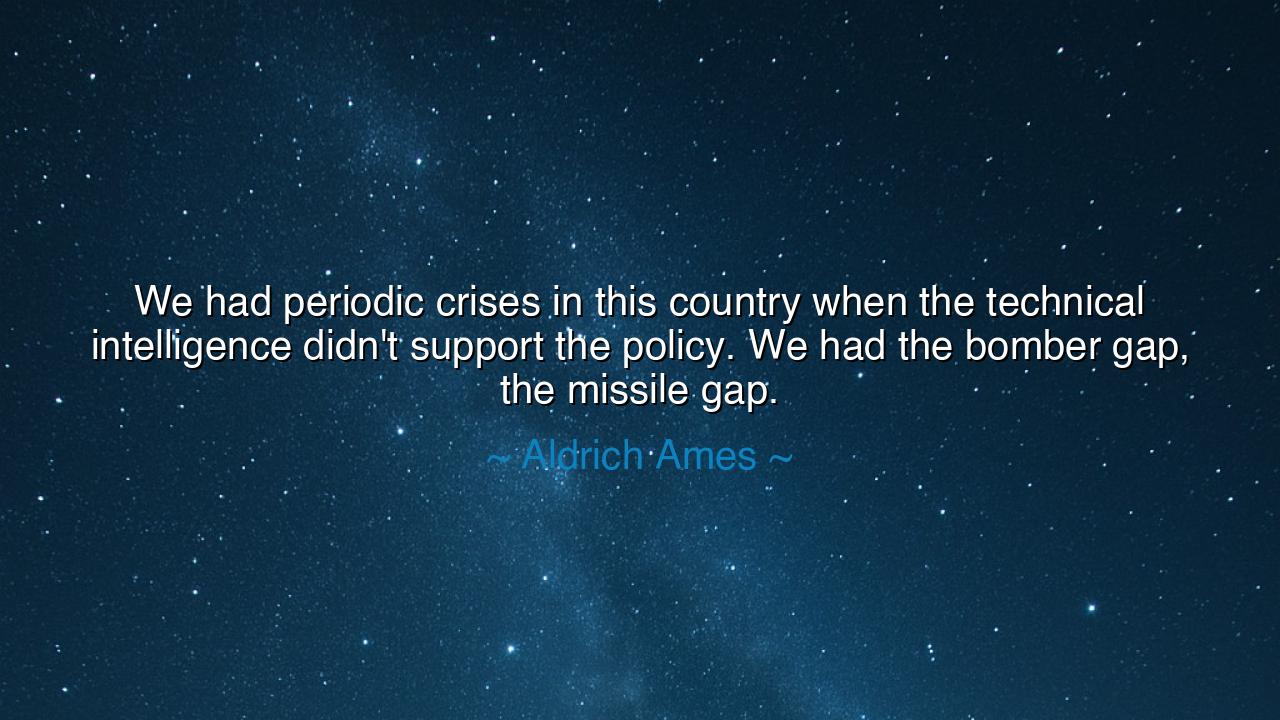
We had periodic crises in this country when the technical
We had periodic crises in this country when the technical intelligence didn't support the policy. We had the bomber gap, the missile gap.






“We had periodic crises in this country when the technical intelligence didn’t support the policy. We had the bomber gap, the missile gap.” Thus spoke Aldrich Ames, a man whose life stands as both a tale of espionage and a mirror of the deep tensions that haunt every age of power. His words, though uttered by one who betrayed his nation, carry the weight of truth — a truth about the fragility of perception, the manipulation of knowledge, and the uneasy marriage between intelligence and policy. In this saying, Ames reveals how nations often build their fears not upon fact, but upon illusion — and how the pursuit of dominance can blind even the wise to reality itself.
The bomber gap and the missile gap were two ghosts that haunted the middle years of the twentieth century, during the long twilight struggle of the Cold War. The first arose in the 1950s, when American leaders, gripped by the belief that the Soviet Union had developed fleets of bombers beyond counting, poured vast sums into armament and defense. Yet when the truth emerged, the gap was an illusion — a phantom born not from enemy strength, but from political fear and incomplete intelligence. Later came the missile gap, another specter of imbalance. Politicians warned that the Soviets possessed far more nuclear missiles than the United States, stirring public dread and driving the arms race to new heights. In time, this too was proven false. The crises Ames recalled were not born of Soviet deception alone, but of the human tendency to let policy shape truth, rather than truth shape policy.
Here lies the heart of his message: that when policy demands a justification, it can twist the light of intelligence into darkness. The wise have long known this danger. In the days of Athens and Sparta, when orators sought war against their rivals, they too molded facts to suit ambition. Thucydides, that ancient historian of human folly, wrote that the first casualty of conflict is truth — that the leaders who hunger for power will always find an argument to feed it. Ames, who lived in the shadowed halls of the CIA, witnessed the modern form of this ancient flaw: a world where satellites, reports, and “technical intelligence” could be bent to serve the will of politics.
To understand this fully, one must see the tragedy of illusion. When a nation fears phantoms, it acts as though they are real — and in doing so, it makes them real. The bomber gap led to an arms race that multiplied weapons beyond reason. The missile gap drove the creation of arsenals that could destroy the earth a hundred times over. Thus, perception became prophecy. By believing itself threatened, a nation became the very thing it feared — an aggressor in the name of defense, a captive of its own false intelligence. This is the eternal lesson: when knowledge serves fear instead of wisdom, it leads humanity toward ruin.
And yet, this truth extends beyond governments and wars; it dwells in the heart of every human being. How often do we, like nations, let our assumptions dictate our understanding? How often do we craft stories that justify our actions, rather than seek the raw, unadorned truth? The bomber gap and missile gap live not only in history books, but in our daily lives — whenever pride blinds us, whenever we believe what comforts us rather than what is real. To see the world as it is, without distortion or desire, is the rarest and most courageous act of all.
Ames, though fallen from grace, leaves us a lesson worth preserving. His words remind us that truth must stand above power, and that intelligence — whether of nations or individuals — must serve conscience, not ambition. To avoid the crises he described, both leaders and citizens must demand integrity in knowledge, humility in action, and transparency in judgment. For when truth is sacrificed for policy, or when facts are bent to fit ideology, the result is not victory, but decay.
Therefore, O seeker of wisdom, learn from the mistakes of the past. Do not let fear become your teacher, nor pride your guide. Seek the clarity of honest intelligence, whether in the affairs of state or the depths of your own heart. For the true power of a nation, like that of a soul, lies not in its weapons or its wealth, but in its commitment to truth. And let this be the enduring lesson of Ames’s lament: that the cost of illusion is always greater than the courage required to see clearly. Only when humanity learns to separate knowledge from desire, and truth from power, will it cease to repeat the endless crises of its own making.






AAdministratorAdministrator
Welcome, honored guests. Please leave a comment, we will respond soon